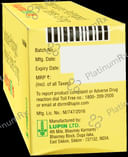Ivabradine
Uses
Ivabradine is used in the treatment of angina (heart-related chest pain) and heart failure.
How it Works
How Ivabradine works Ivabradine is a medication that lowers heart rate. It functions by decreasing the heart rate, which in turn reduces the oxygen demand of the heart. As a result, the heart operates more efficiently.
Side Effects
Common side effects of Ivabradine include slow heart rate, luminous phenomena (enhanced brightness), high blood pressure, and atrial fibrillation.
Expert Advice
- Ivabradine may cause dizziness or sleepiness.
- Do not drive or engage in activities requiring concentration until you understand how it affects you.
- You may experience temporary changes in your vision, such as enhanced visual brightness.
- These visual changes may occur within the first 2 months of treatment and should gradually resolve.
- Monitor your blood pressure while taking Ivabradine, as it may increase your blood pressure.
- Monitor your heart rate while on this medication, as a low heart rate is a common side effect.
- Inform your doctor if you experience symptoms of low heart rate, such as dizziness, fatigue, or low energy.
- Your doctor has prescribed Ivabradine to treat heart diseases, particularly heart failure or angina (chest pain).
- Ivabradine should be taken with food.
Related Medications
Ivabradine 5mg

₹285
₹127.5
MRP ₹255
Ivabradine 5mg

₹249
₹127.5
MRP ₹255
Ivabradine 5mg

₹240.5
₹127.5
MRP ₹255
Ivabradine 5mg

₹108.9
₹127.5
MRP ₹255
Ivabradine 5mg

₹185
₹127.5
MRP ₹255
Ivabradine 5mg

₹140
₹127.5
MRP ₹255
Ivabradine 5mg

₹333.5
₹127.5
MRP ₹255
Ivabradine 5mg

₹215.8
₹127.5
MRP ₹255
Ivabradine 5mg

₹321.6
₹127.5
MRP ₹255
Ivabradine 5mg

₹231.7
₹127.5
MRP ₹255
Ivabradine 15mg

₹560.6

₹506.5
MRP ₹617.7
Ivabradine 15mg

₹443

₹506.5
MRP ₹617.7
Ivabradine 10mg

₹269.8
MRP ₹329
Ivabradine 10mg

₹512.6

₹269.8
MRP ₹329
Ivabradine 10mg

₹345

₹269.8
MRP ₹329
Ivabradine 5mg

₹210
₹127.5
MRP ₹255
Ivabradine 10mg

₹409.4

₹269.8
MRP ₹329
Ivabradine 5mg

₹249.4
₹127.5
MRP ₹255
Ivabradine 7.5mg

₹572.3

₹115.8
MRP ₹231.6
Ivabradine 7.5mg

₹522.1

₹115.8
MRP ₹231.6
Ivabradine 7.5mg

₹180

₹115.8
MRP ₹231.6
Ivabradine 7.5mg

₹131.8

₹115.8
MRP ₹231.6
Ivabradine 7.5mg

₹115.8
MRP ₹231.6
Ivabradine 5mg

₹203.5
₹127.5
MRP ₹255
Ivabradine 10mg

₹410

₹249
MRP ₹300
Flat ₹100 off on first app order | Use Code: APP100 |
Flat ₹100 off on first app order
USE CODE: APP100

Download Now